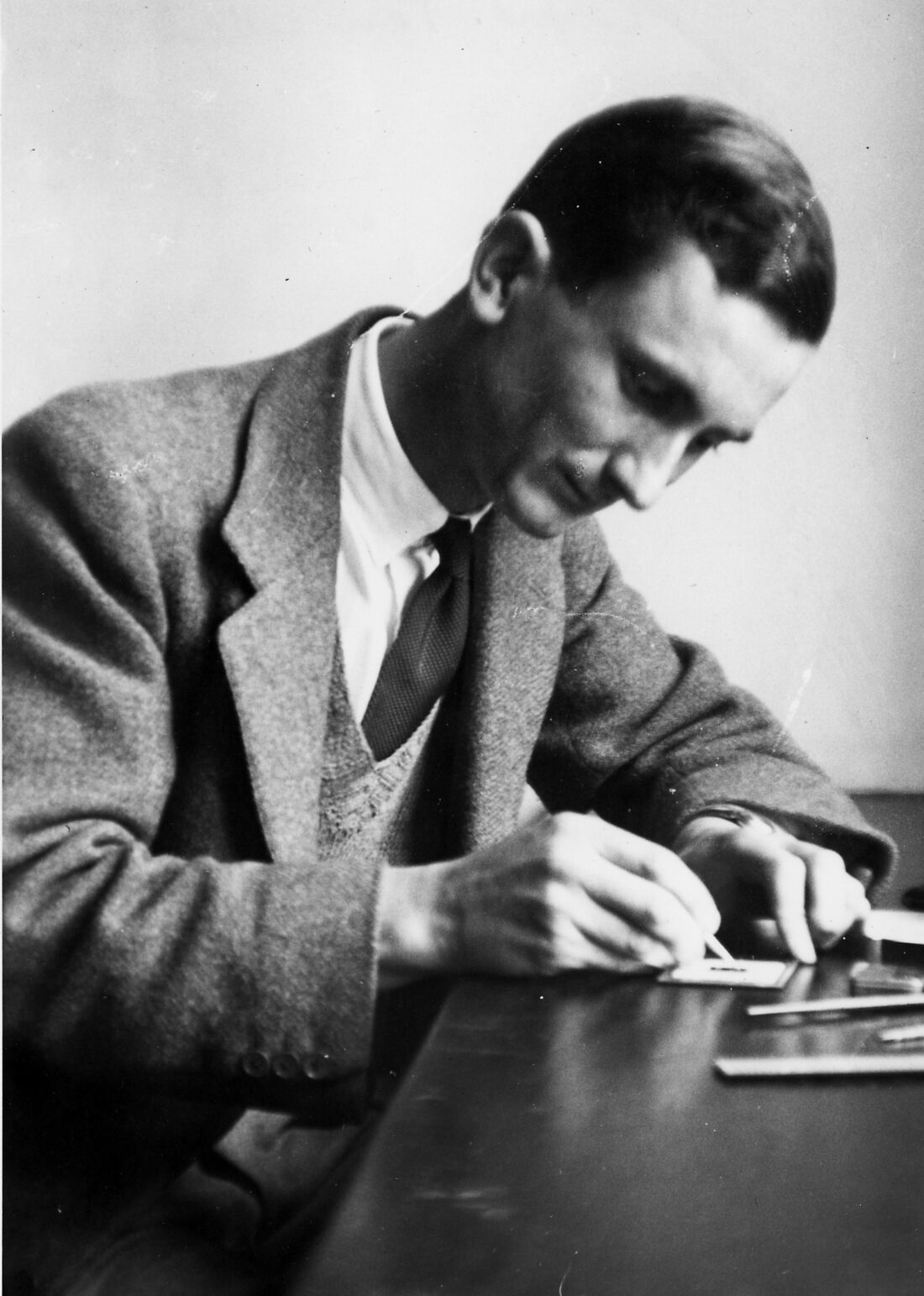 Norman Heatley graduated in Natural Sciences in 1933 at St John’s College, Cambridge, and stayed on to do research for a PhD in Biochemistry. Soon afterwards he was invited to come to Oxford to work with Chain and Florey. Heatley had a genius for invention. He devised a new assay that measured the activity of penicillin, established appropriate conditions under which penicillin was stable, and pioneered a multi-stage technique to isolate it from the culture fluid and concentrate it. As succinctly up summed by Sir Henry Harris, ‘without Fleming, no Chain or Florey; without Chain, no Florey; without Florey, no Heatley; without Heatley, no penicillin.’
Norman Heatley graduated in Natural Sciences in 1933 at St John’s College, Cambridge, and stayed on to do research for a PhD in Biochemistry. Soon afterwards he was invited to come to Oxford to work with Chain and Florey. Heatley had a genius for invention. He devised a new assay that measured the activity of penicillin, established appropriate conditions under which penicillin was stable, and pioneered a multi-stage technique to isolate it from the culture fluid and concentrate it. As succinctly up summed by Sir Henry Harris, ‘without Fleming, no Chain or Florey; without Chain, no Florey; without Florey, no Heatley; without Heatley, no penicillin.’
Previous Heatley Lecture Speakers
Dr Peter Walter
(Altos Labs, Bay Area Institute of Science/ Dept. of Biochemistry & Biophysics, University of California)
12th March 2024
“Targeting the Cell’s Stress Pathways for Therapeutic Benefit”
Dr Helen H Hobbs
(University of Texas Southwestern Medical Center/ Howard Hughes Medical Institute)
8th June 2023
“Genetics of Fatty Liver Disease: Ancient Mutations for a Common Disease”
Sir Gregory Winter
(Trinity College, Cambridge/ Former Deputy Director Laboratory of Molecular Biology)
11th February 2019
“Harnessing the power of evolution for making new medicines: phage display of peptides and antibodies”
Dr Cynthia Kenyon
(Calico Life Sciences LLC)
23rd April 2018
“Processes that Enhance Proteostasis and Longevity in C. elegans”
Professor Jeremy Farrar
(Director of the Wellcome Trust)
1st November 2016
“1941 – 2041 – A changing world”
Professor Joan Steitz
(Sterling Professor of Molecular Biophysics and Biochemistry, Yale School of Medicine)
1st March 2016
“Non-coding RNAs of Viral and Cellular Origin: more surprises”
Professor Karen Vousden
(CR-UK Beatson Institute, Glasgow, UK)
14th October 2014
“Metabolic control of cancer fate decisions”
Professor Susan Lindquist
(Whitehead Institute, MIT)
28th October 2013
“From yeast cells to patient neurons: a powerful discovery platform for Parkinson’s and Alzheimer’s Disease”
Dr Antonio Lanzavecchia
(Institute for Research in Biomedicine, Bellinzona, Switzerland)
8th November 2012
“Dissecting the human immune response to pathogens and self antigens”
Dr Alexander Rudensky
(Howard Hughes Medical Institute Tri-Institutional Professor, Memorial Sloan-Kettering Cancer Center, the Rockefeller and Cornell University)
27th October 2011
“Control of immune homeostasis by regulatory T cells”
Professor Elizabeth Blackburn
(University of California, San Francisco)
27th May 2010
“Responses to Perturbing Telomere Maintenance”
Professor Peter Palese
(Horace W. Goldsmith Professor and Chair Department of Microbiology , Mount Sinai School of Medicine)
5th November 2009
“Influenza Pandemics: Past and Future”
Professor Bruce Buetler
(Chairman, Dept of Genetics, The Scripps Research Institute, La Jolla)
16th October 2008
“Forward Genetic Analysis of Innate Immunity in Mammals”
Professor Anthony Hyman
(Max Plank Institute of Molecular Cell Biology and Genetics, Dresden)
29th November 2007
“Boveri revisited”
Professor Carl Nathan
(Weill Medical College of Cornell University, New York)
26th October 2006
“Can Immunology Contribute to Chemotherapy? Challenges of Tuberculosis”
Professor Peter Doherty
(Department of Microbiology and Immunology University of Melbourne)
24th November 2005
“Virus Killers and Killer T Cells”
Professor Robert Tjian
(Howard Hughes Medical Institute)
17th June 2004
“Deconstructing and reconstituting the Metazoan Transcriptional Apparatus”
Professor Tim Hunt
(Cancer Research UK)
10th July 2003
“The control of cell growth and division”
Professor Sydney Brenner
(SALK Institute for Biological Studies”
27th March 2003
“From Genes to Organisms”
Professor Gunter Blobel
(The Rockefeller University, New York)
30th April 2002
“Protein Targeting”
Professor Thierry Boon
(Director of the Ludwig Institute for Cancer Research Brussels”
15th March 2001
“Cancer immunotherapy: the end of the beginning”
Professor Peter Krammer
(German Cancer Research Centre, Heidelberg)
16th March 2000
“CD95 (APO-1/Fas) mediated apoptosis: signalling and diseases”
Dr John Walker
(MRC Laboratory of Molecular Biology, University of Cambridge)
15th October 1998
“The mitochondrion in health, disease and death”
Dr Nigel Unwin
(MRC Laboratory of Molecular Biology, University of Cambridge)
12th March 1998
“How ion channels open rapidly in response to neurotransmitter”
Dr Pierre Golstein
(Centre d’immunologie de Marseille-Luminy)
06th February 1997
“Cell death and evolution”
Professor T J Mitchison
(Department of Cellular and Molecular Pathology, University of California, San Diego)
15th February 1996
“Probing cytoskeleton dynamics with caged fluorochromes”
Professor Alan Fersht
(Department of Chemistry, University of Cambridge)
26th January 1995
“Pathways of protein folding”
Professor Tim Springer
(Center for Blood Diseases, Harvard University)
12th May 1994
“ICAM-1 function: in vivo interaction with rhinovirus studied by plasmon resonance”
Professor Andrew McMichael
(Institute of Molecular Medicine, University of Oxford)
10th February 1992
“Molecular recognition in antiviral immunity”
Explore more
Seminars
The Dunn School attracts stellar speakers from around the world.
Our History
Over our 100 years of history, our research has saved millions, if not billions, of lives. The development of the first antibiotic, penicillin, ranks among the top medical discoveries of all time, but we have never rested on those laurels.
Our Research
Over 30 groups work to uncover the molecular and cellular mechanisms underlying disease, in a supportive environment with access to state-of-the-art scientific facilities.